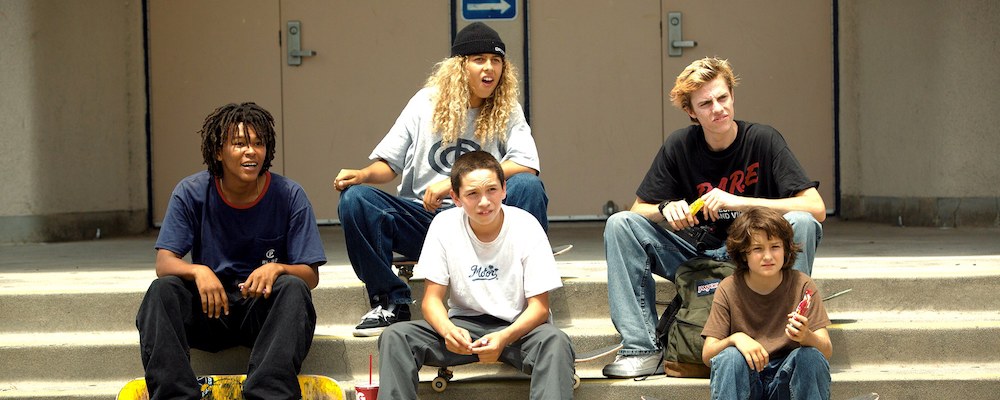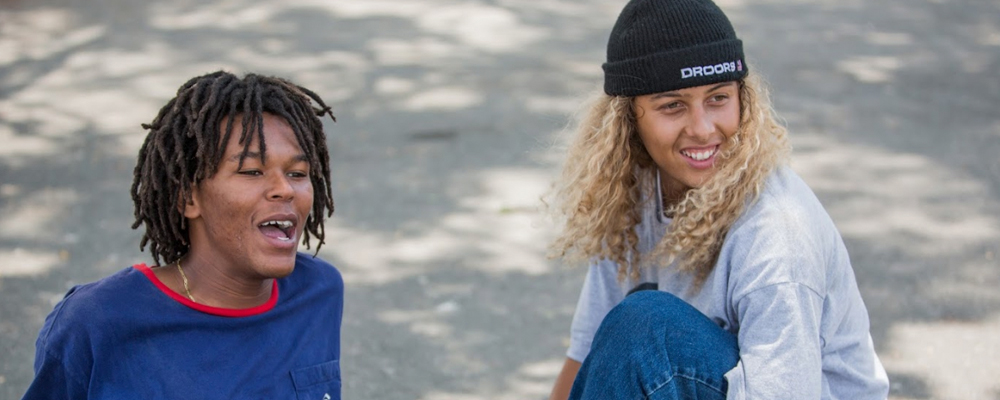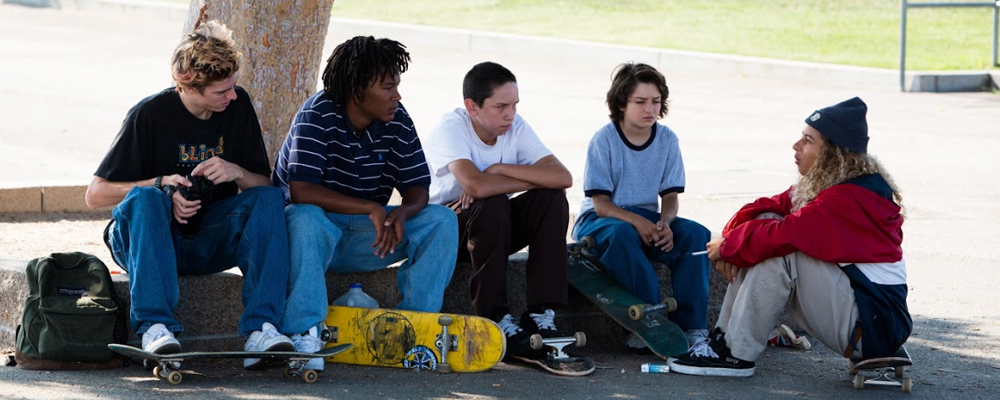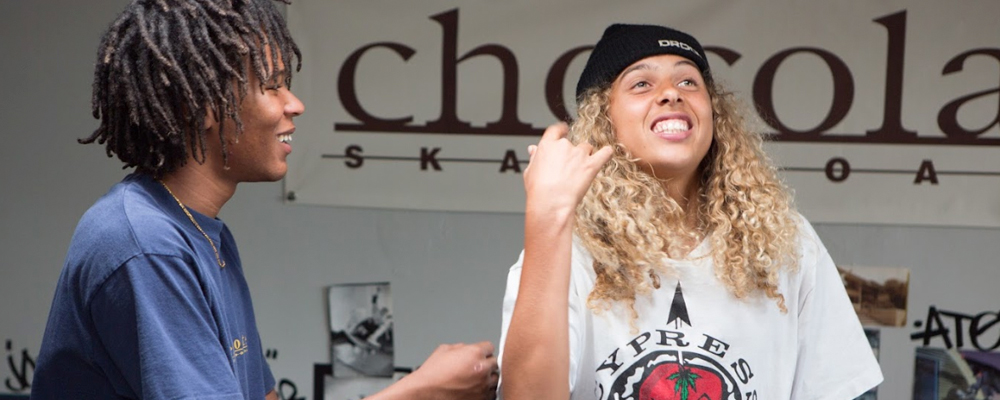Jonah Hill’s Directorial Debut ‘Mid90s’ Tells a Poignant Tale of Wayward Youth
Alci Rengifo
“Mid90s” feels like a work taken completely from memory. Actor Jonah Hill now reveals himself as an impressive director, capable of telling small but poignant stories. He belongs to a generation of filmmakers now of a certain age, mid to late 30s, who are mining their childhoods to go back through cinema and rediscover how a specific decade felt. Earlier this year Bo Burnham did the same with “Eighth Grade,” now Hill delivers a grainier film about the kids who grew up under the shadow of the grunge era.
Stevie (Sunny Suljic) lives in a small California house with his single mother Dabney (Katherine Waterston) and older brother Ian (Lucas Hedges). Stevie is 13 and it’s the mid-1990s. Grunge style is in as well as the gangsta rap look. It’s not a particularly happy home. Dabney is one of those moms who is so loving she can’t comprehend the mood swings hitting her teenage son, and Ian is the grumpy older sibling who bullies Stevie into breaking the rules, then pounds him when they get in trouble. Entranced by the local skaters, Stevie wanders into the local Motor Avenue skate shop and makes friends with Ruben (Gio Galicia), “Fuckshit” (Olan Prenatt), Ray (Na-kel Smith) and “Fourth Grade” (Ryder McLaughlin). These guys live to their own rhythm, skating through L.A.’s ins and outs, lounging around and having hilariously aloof discussions about life, girls and parties. With them Stevie feels as if he has finally found his place and absorbs the lingo, the look and practices his skateboard skills day and night. But all friendships have their blemishes. Stevie will learn some hard lessons about growing up and how everyone has their own baggage.
There are many moments in “Mid90s” where Hill’s effect is so authentic that it feels like a documentary. Its grainy look, achieved by cinematographer Christopher Blauvelt, feels like an homage to the kind of indie filmmaking that was so in vogue in the pre-digital camera 1990s. We are reminded of the films of Larry Clark in the way Hill starkly films youth culture with its rough edges (although it never becomes as explicit or despairing as Clark’s work). What Hill does so eloquently is show us Stevie and the era he’s growing up in. Videogames are a big pastime, but there are no iPhones, social media is still a decade away. Fourth Grade captures the group’s exploits with his video camera, a pre-digital artifact which will bring back memories of endless stockpiles of little tapes for those of us who lived through those times. This gang kills boredom by sitting around, maybe drinking and discussing the most absurdly hilarious topics with the cluelessness of being young. It feels as if they are truly in bliss when cruising through a street in twilight on their boards. Hill’s screenplay does something interesting with the dialogue. It’s engaging yet also revealing in how it captures the way people talked in a more pre-politically correct moment. Ruben will pick on Stevie for being nice and saying thank you, warning him people will think “you’re a fag.” That’s exactly how people talked back then, and Hill brilliantly chronicles the mindsets and moods of that last decade of the 20th century with this microcosmic story.
More universally, Hill’s screenplay doesn’t need a specific plot, like “Eighth Grade” it is concerned with showing the stages of growth in adolescence. Stevie starts off as a sweet-looking kid in a regular t-shirt and jeans, and by the end he’s in the full skater uniform complete with a baseball cap turned backwards, baggy sweaters and talking a little tougher. Hill’s approach isn’t to deliver a specific message, it’s more of a portrait of young people who grow up on the fringes of suburbia and form their own tribal groups. Stevie’s group becomes his home away from home, where he can taste the first sensations of rebellion and independence. A party scene where he loses his virginity is written and directed with an endearing honesty, with Stevie trying to keep his cool when a girl asks if he’s ever been with anyone (“I don’t kiss and tell”). The fights with his mother are never stretched out, instead they come out like fast, angry fits. The dynamic between the characters works because everyone has a unique, personality, as if they were stories onto themselves. We don’t need explanations for why Ian is a grump, he’s obviously a cash-strapped guy watching his younger sibling gain a “cool” status. The skater group itself is so likeable for just how flawed and wayward everyone is. Fuckshit speaks with a machine gun rapidity, but he’s also quite alone and starts making the unwise decision of blocking everything out with alcohol. Fourth Grade already knows he wants to be a filmmaker, and we hope life grants him a chance. Ray is the more mature of the group, who takes skateboarding seriously as a sport, and feels the frustration at times of being pulled under by bad friendships. Ruben is perfectly written as that strange character we’ve befriended in life, who then project their own insecurities on us. Once the group takes a real liking for Stevie, Ruben backs away and becomes aggressive out of pure jealousy.
If reviewing “Mid90s” feels like a description of people, that’s because this is the film’s special achievement. It allows us to get to know characters living in a specific moment, but enduring the same trials young people will face forever. It’s not a sad film however, and a car crash near the end results in a moment of quiet tenderness involving two bottles of orange juice. No words need to be said, it’s just a nice moment where someone shows they do care after all. Even Trent Reznor and Atticus Ross, famous for their eerie scores for “The Social Network” and “Gone Girl,” compose sounds that are more wistful here. “Mid90s” will take viewers of a specific age back to a time not so far, yet far away enough. But at its core it’s about how growing up is never easy, now or ever.
“Mid90s” opens Oct. 19 in select theaters and expands Oct. 26 nationwide.




